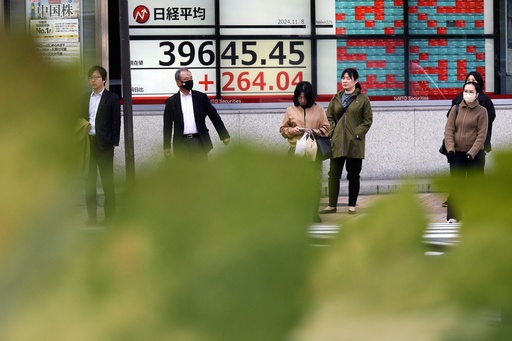
HONG KONG – Asian markets saw positive movement on Friday following a rise in U.S. stock prices, as the Federal Reserve announced another interest rate cut aimed at alleviating economic stress.
Oil prices experienced a decline, while U.S. futures trended slightly upwards.
Investors across the region are eagerly anticipating government actions from Beijing to stimulate the slowing Chinese economy, particularly after the national legislature concluded a crucial meeting this week.
“If the Chinese government follows through with effective measures, we could witness a significant rally throughout the region, as investors prepare for renewed market momentum,” remarked Stephen Innes of SPI Asset Management in his commentary.
In the Hong Kong market, the Hang Seng index rose by 0.5%, reaching 21,055.62, while the Shanghai Composite index climbed 0.7% to close at 3,495.38.
Japan’s Nikkei 225 index also saw a gain of 0.3%, finishing at 39,476.64.
However, shares of Nissan Motor Corp dropped significantly early in the day, following an announcement the previous day about the company’s decision to eliminate 9,000 jobs and reduce its global production capacity by 20% due to dwindling sales and increasing costs associated with inventory management.
In South Korea, the Kospi index surged by 0.7% to reach 2,581.50, while Australia’s S&P/ASX 200 gained 0.9% to close at 8,302.10.
On the U.S. front, the S&P 500 index climbed by 0.7% to 5,973.10, continuing its upward trend from the day before, spurred by the presidential victory of Donald Trump. The Dow Jones Industrial Average remained nearly flat at 43,729.34, while the Nasdaq composite rose by 1.5% to 19,269.46.
The Federal Reserve’s decision to lower the primary interest rate by a quarter percentage point did not create significant market fluctuations, as investors had largely anticipated this move.
The central bank initiated this rate relief in September, suggesting that further reductions may be forthcoming, with a focus on maintaining a robust job market as inflation approaches the 2% target.
Investors are presently uncertain about how Trump’s victory may alter the Federal Reserve’s plans.
Trump is advocating for tariffs and policies that economists warn could elevate inflation levels alongside economic growth, prompting traders to adjust their projections for potential rate cuts in the upcoming year. While lower interest rates may stimulate economic growth, they can simultaneously exacerbate inflation concerns.
However, during recent statements, Fed Chair Jerome Powell confirmed that current policies will remain unchanged, stating, “In the near term, the election will have no effects” on interest-rate adjustments.
Powell further indicated that the future policies following Trump’s return to the White House remain uncertain and urged against speculation.
JPMorgan Chase experienced a drop of 4.3% following a day when banks led the market rally, based on expectations for greater profits due to a healthier economy and reduced regulations. Its performance, along with that of Goldman Sachs, contributed to the Dow Jones Industrial Average’s minimal decline.
In terms of smaller U.S. stocks, the Russell 2000 index fell by 0.4%, having experienced a substantial gain in the preceding day, largely due to optimism surrounding Trump’s domestic policy priorities.
Trump Media & Technology Group, a company closely associated with the president-elect, saw its stock value decrease by 23%.
The yield on the 10-year Treasury bond decreased to 4.33%, down from 4.44% recorded late Wednesday.
Additionally, a report released on Thursday indicated a slight increase in U.S. unemployment benefit applications, though the numbers still remain relatively low. Another report highlighted a boost in worker productivity over the summer, which can help moderate inflation although not to the extent that economists had predicted.
In early trading on Friday, U.S. benchmark crude oil fell by 33 cents, settling at $72.03 per barrel, while Brent crude, the global standard, also dropped by 30 cents to $75.33 per barrel.
The dollar strengthened against the Japanese yen, rising to 153.00 from 152.94, while the euro experienced a slight decrease, falling to $1.0788 from $1.0804.
